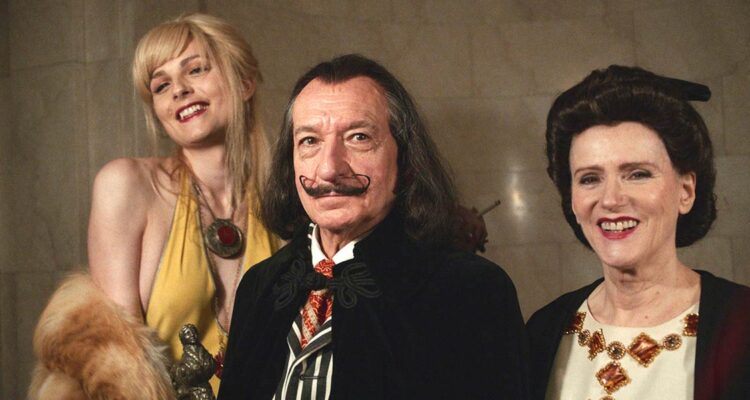Mary Harron is too good a director to make a drab, conventional biopic, so it’s disappointing to report that with “Dalíland,” she’s done just that. It’s not a complete waste, and she manages to insert a handful of distinctive flourishes and memorable characters. But the picture never escapes the box it’s been placed in or transcends a key, fundamental error in its conception – and, likely, none of that will matter anyway since the primary focus of its coverage will, presumably, continue to be the fleeting presence of Ezra Miller. (More on that presently.)
READ MORE: TIFF 2022: 16 Must-See Films To See At The Toronto Film Festival
John Walsh’s Final Draft “biopic” template screenplay opens in 1985, as a television runs an old episode of “What’s My Line,” with the artist and multimedia personality Salvador Dalí (Ben Kingsley) as the mystery guest. They’re playing the rerun because Dalí has been injured, perhaps critically, in a fire in his home – a bit of information that catches the attention of James Linton (Christopher Briney). You see, back in 1974, Linton was working as a young assistant at Dalí’s regular gallery in New York City and, via his work there, was drawn into the artist’s orbit. Dalí was still painting, sure, but the critics weren’t taking him seriously anymore, and his primary preoccupation was his parties, hedonistic assemblages of young and old, celebrities and nobodies, men and women and all points in between, partaking in sex and drugs and rock and roll.
Everyone refers to him as “Dalí” – even himself – and Kingsley plays him with the expected grandness. Young James is initially invited in by his longtime companion Gala (Barbara Suwoka), who is the power and the decision-maker, the force behind the man. It’s a fascinating dynamic; “I need her to push me,” Dalí explains. “Without my Gala, I would be in an asylum or a hobo under a bridge.” Her reason for wanting James around is simpler; his boss explains: “You’re a beautiful boy, and she has the libido of an electric eel.”
READ MORE: Fall 2022 Preview: 60+ Must-See Films To Watch
Dalí himself notes that James has the face of an angel and dubs him “San Sebastian.” He likes having him around, announcing that he will borrow James to use as an assistant until his gallery show three weeks hence. James’ boss allows it, so he can ensure that the work gets done, setting up a struggle between the ticking clock of the deadline and Dalí’s other impulses (“This is for a painting?” James asks when given a shipping list, and Dalí replies, “No, for a party”), and thus he becomes, at least for a time, part of Dalí’s little circle of sycophants and hangers-on. “Everyone is here for a reason,” explains the similarly at-his-service Ginesta (Suki Waterhouse). “You just don’t know what yours is yet.”
In between painting and orgies, Dalí tells James bits of his story, seen in flashback – though he and James are present in them, observing and commenting on the actions of his younger self (Ezra Miller, overacting wildly). It’s an odd narrative choice because it’s so half-hearted; the flashbacks account for only three (mercifully) brief scenes, one of them a corny dramatization of Dalí visualizing the melting clock painting, just the worst kind of formula biopic bullshit. “No one who sees this painting will ever forget it,” Gala announces when viewing the painting, and they’d better hope that’s right because they don’t show it. In light of Miller’s many controversies, there has been some question about removing their scenes – and Harron should, not because of Miller’s behavior, but because they’re just bad scenes, and the film would be better without them.
But that can only do so much. “Dalíland” calms and slows down considerably in the third act, when James accompanies Dalí and Gala to Europe, much to its detriment. Some of the peeks into his process – particularly in the post-Warhol era of reproduction and branding – are of interest, and Kingsley is very good, which goes without saying. Sure, he indulges in a bit of mugging, but he gets the character’s theatricality, his specific zest. He also does some fine physical acting; there’s a wonderful scene of him carefully making himself up and dressing for a party (peacocking, really). One cannot deny the pleasures of watching him dancing to disco music in full Dalí regalia. And Suwoka expertly conveys the fire and tempestuousness of Gala and the complexity of their relationship.
But Harron and Walsh make the fundamental miscalculation of telling the story through the eyes of a nobody, an utterly uninteresting character who almost becomes an obstruction to the good stuff in the movie. He’s written as a blank slate, which is inexplicable; the character is an amalgam of several different people, so it’s not like there was some reality to serve by not giving him a personality. On top of that, newcomer Briney is just bland, a wet fish of a screen presence, and the combination of flat actor and flat character is a dire one, deadly to the pulse of the picture.
Harron’s direction is competent but uninspired, mainly when reflecting that the same filmmaker dramatized a similar time and scene in “I Shot Andy Warhol” to such great effect. It’s been a long time since that film, and sadly, “Dalíland” is a long way from it. [C-]
Follow along with all our coverage of the 2022 Toronto International Film Festival.

